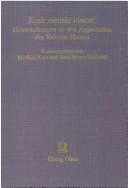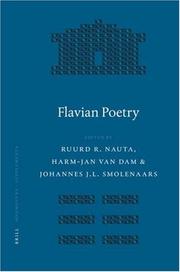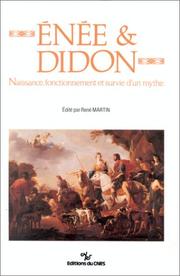| Listing 1 - 6 of 6 |
Sort by
|

ISBN: 348709410X 9783487094106 Year: 1991 Volume: 48 Publisher: Hildesheim Olms
Abstract | Keywords | Export | Availability | Bookmark
 Loading...
Loading...Choose an application
- Reference Manager
- EndNote
- RefWorks (Direct export to RefWorks)
Valerius Flaccus, Caius --- Valerius Flaccus, Gaius, --- Argonauts (Greek mythology) in literature --- Epic poetry, Latin --- Congresses. --- History and criticism --- -Epic poetry, Latin --- -Latin epic poetry --- Latin poetry --- Congresses --- -Congresses --- Valerius Flaccus, Gaius --- Latin epic poetry --- History and criticism&delete& --- Argonauts (Greek mythology) in literature - Congresses. --- Epic poetry, Latin - History and criticism - Congresses.

ISBN: 9047417712 9789047417712 9004147942 9789004147942 Year: 2006 Publisher: Leiden: Brill,
Abstract | Keywords | Export | Availability | Bookmark
 Loading...
Loading...Choose an application
- Reference Manager
- EndNote
- RefWorks (Direct export to RefWorks)
The reign of the Flavian emperors (69-96) saw the production of a large and varied body of Latin poetry: the epics of Valerius Flaccus, Silius Italicus and Statius, the Silvae of the same Statius, and the Epigrams of Martial. This poetry, long seen as derivative or decadent, is now increasingly appreciated for the daring originality of its responses both to the Latin literary tradition and to the contemporary Roman world. In the summer of 2003, the first-ever international conference on Flavian poetry, was held at Groningen, The Netherlands, bringing together leading scholars in the field from Europe, North America and Australasia. This volume offers a selection of the papers delivered on that occasion.
Latin poetry --- Latin literature --- History and criticism --- Epic poetry, Latin - History and criticism - Congresses --- Latin poetry - History and criticism - Congresses --- Statius, P. Papinius - (Publius Papinius) - Congresses --- Martial - Congresses --- Pliny, - the Younger - Congresses --- Epic poetry, Latin --- Statius, P. Papinius - (Publius Papinius) --- Martial --- Pliny, - the Younger
Book
ISBN: 9782356131201 2356131205 2356133119 Year: 2014 Volume: 1 Publisher: Bordeaux Ausonius Éditions
Abstract | Keywords | Export | Availability | Bookmark
 Loading...
Loading...Choose an application
- Reference Manager
- EndNote
- RefWorks (Direct export to RefWorks)
Ce volume cherche à montrer comment les questions historiques, idéologiques, sociales ou religieuses trouvent une expression privilégiée dans l'épopée latine et comment cette expression évolue avec les bouleversements politiques, philosophiques, religieux ou esthétiques. Plusieurs articles se concentrent tout naturellement sur l'épopée classique, fondement de la tradition latine, mais plusieurs autres se penchent sur les inflexions du genre dans les épopées post-classique, tardive et médiévale. La thématique générale est donc celle de l'expression épique dans ses rapports avec l'époque des auteurs et les problèmes politiques et éthiques liés à celle-ci. Les articles réunis ici éclairent ainsi tout un pan de l'histoire de l'épopée et, en embrassant dans une large variété la tradition de l'épopée latine, fournissent un précieux ouvrage de référence.
Latin literature --- Epic poetry, Latin --- Littérature latine --- Poésie épique latine --- History and criticism --- Histoire et critique --- Épopées latines --- Épopées latines médiévales et modernes --- Influence littéraire, artistique, etc. --- Création littéraire --- Epic poetry, Latin (Medieval and modern) --- Littérature latine --- Poésie épique latine --- Épopées latines --- Épopées latines médiévales et modernes --- Influence littéraire, artistique, etc. --- Création littéraire --- Latin epic poetry, Medieval and modern --- Latin poetry, Medieval and modern --- Latin epic poetry --- Latin poetry --- Epic poetry, Latin - History and criticism - Congresses --- Epic poetry, Latin (Medieval and modern) - History and criticism - Congresses --- innovation --- réécriture --- philosophie --- épopée --- politique --- topique --- latin --- tradition --- mythe --- idéologie --- auctorialité
Book
ISBN: 9789004177550 9004177558 9786612948725 9047430999 1282948725 9789047430995 Year: 2010 Volume: 321 Publisher: Leiden Brill
Abstract | Keywords | Export | Availability | Bookmark
 Loading...
Loading...Choose an application
- Reference Manager
- EndNote
- RefWorks (Direct export to RefWorks)
This book, a sequel to Clio and the Poets (Brill 2002), takes as its point of departure Quintilian's statement that 'historiography is very close to the poets': it examines not only how verse interfaces with historical texts but also how first-century AD Roman historians engage with issues and patterns of thought central to contemporary poetry and with specific poetic texts. Included are substantive discussions of a wide range of authors, notably Lucan, Seneca, Statius, Pliny, Juvenal, Silius Italicus, and Tacitus.
Historical poetry, Latin --- Epic poetry, Latin --- Literature and history --- History in literature --- Poésie historique latine --- Poésie épique latine --- Littérature et histoire --- Histoire dans la littérature --- History and criticism --- Congresses. --- Congresses --- Histoire et critique --- Congrès --- Rome --- Rome dans la littérature --- Historiography --- In literature --- Historiographie --- Epic poetry, Latin - History and criticism. --- Epic poetry, Latin -- History and criticism -- Congresses. --- Historical poetry, Latin - History and criticism. --- Historical poetry, Latin -- History and criticism -- Congresses. --- History in literature. --- History in literature -- Congresses. --- Literature and history - Rome. --- Literature and history -- Rome -- Congresses. --- Rome - Historiography. --- Rome -- Historiography -- Congresses. --- Rome - In literature. --- Rome -- In literature -- Congresses. --- Languages & Literatures --- Greek & Latin Languages & Literatures --- Poésie historique latine --- Poésie épique latine --- Littérature et histoire --- Histoire dans la littérature --- Congrès --- Rome dans la littérature --- History and literature --- History and poetry --- Poetry and history --- History --- Latin historical poetry --- Latin poetry --- Latin epic poetry --- Rim --- Roman Empire --- Roman Republic (510-30 B.C.) --- Romi (Empire) --- Byzantine Empire --- Rome (Italy) --- History and criticism. --- Historical poetry, Latin - History and criticism - Congresses --- Epic poetry, Latin - History and criticism - Congresses --- Literature and history - Rome - Congresses --- History in literature - Congresses --- Rome - Historiography - Congresses --- Rome - In literature - Congresses
Book
ISBN: 9789004324527 9004324526 9789004324664 9004324666 Year: 2016 Volume: 394 Publisher: Leiden Boston
Abstract | Keywords | Export | Availability | Bookmark
 Loading...
Loading...Choose an application
- Reference Manager
- EndNote
- RefWorks (Direct export to RefWorks)
Family in Flavian Epic examines the treatment of family bonds in Valerius Flaccus’ Argonautica , Statius’ Thebaid and Achilleid , and Silius Italicus’ Punica . The eleven contributions consider the representation of epic parents, children, siblings, and spouses, and their interaction with each other, demonstrating the Flavian poets’ engagement with their epic, and more generally literary, tradition. At the same time, Roman attitudes towards the family and Flavian concerns especially related to dynastic harmony and civil war also characterise both historical and mythological members of Flavian epic families.
Epic poetry, Latin --- Families in literature --- Kinship in literature --- Poésie épique latine --- Familles dans la littérature --- Parenté dans la littérature --- History and criticism --- Congresses. --- Congresses --- Histoire et critique --- Congrès --- Valerius Flaccus, Gaius, --- Statius, P. Papinius --- Silius Italicus, Tiberius Catius. --- Epic poetry, Latin. --- Families in literature. --- Kinship in literature. --- Silius Italicus, Tiberius Catius --- Criticism and interpretation --- Argonautica (Valerius Flaccus, Gaius). --- Statius, P. Papinius. --- Family in literature --- Latin epic poetry --- Latin poetry --- E-books --- Poésie épique latine --- Familles dans la littérature --- Parenté dans la littérature --- Congrès --- Silio, --- Silius, --- Silius Italicus, C. --- Silius Italicus, Catius --- Silius Italicus, Tiberius Catius, --- Sillius, --- Estacio --- Stace --- Statius, Papinius --- Statius, Publius Papinius --- Stat︠s︡iĭ, Publiĭ Papiniĭ --- Стаций, Публий Папиний --- Stazio --- Epic poetry, Latin - History and criticism - Congresses --- Families in literature - Congresses --- Kinship in literature - Congresses

ISBN: 2222044715 9782222044710 Publisher: Paris Éditions du Centre National de la Recherche Scientifique
Abstract | Keywords | Export | Availability | Bookmark
 Loading...
Loading...Choose an application
- Reference Manager
- EndNote
- RefWorks (Direct export to RefWorks)
Aeneas (Legendary character) in literature --- Dido (Legendary character) in literature --- Aeneas (Legendary character) --- Dido (Legendary character) in art --- Enée (Personnage légendaire) dans la litterature --- Didon (Personnage légendaire) dans la littérature --- Enée (Personnage légendaire) --- Didon (Personnage légendaire) dans l'art --- Art --- mythology [literary genre] --- Dido en Aeneas --- Dido --- Aeneas --- Dido (Legendary character). --- Aeneas (Legendary character). --- Literature, Modern --- Epic poetry, Latin --- Roman influences --- History and criticism --- Enée (Personnage légendaire) dans la litterature --- Didon (Personnage légendaire) dans la littérature --- Enée (Personnage légendaire) --- Didon (Personnage légendaire) dans l'art --- In literature --- Art. --- Dido [Mythological character] --- Aeneas [Mythological character] --- Literature, Modern - Roman influences - Congresses. --- Epic poetry, Latin - History and criticism - Congresses. --- antieke cultuur
| Listing 1 - 6 of 6 |
Sort by
|

 Search
Search Feedback
Feedback About UniCat
About UniCat  Help
Help News
News